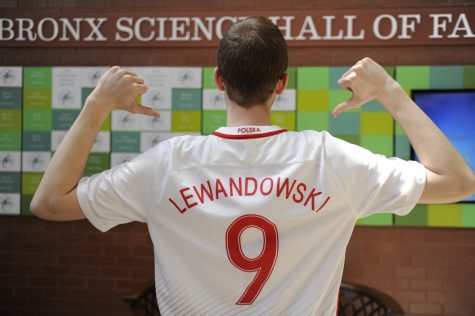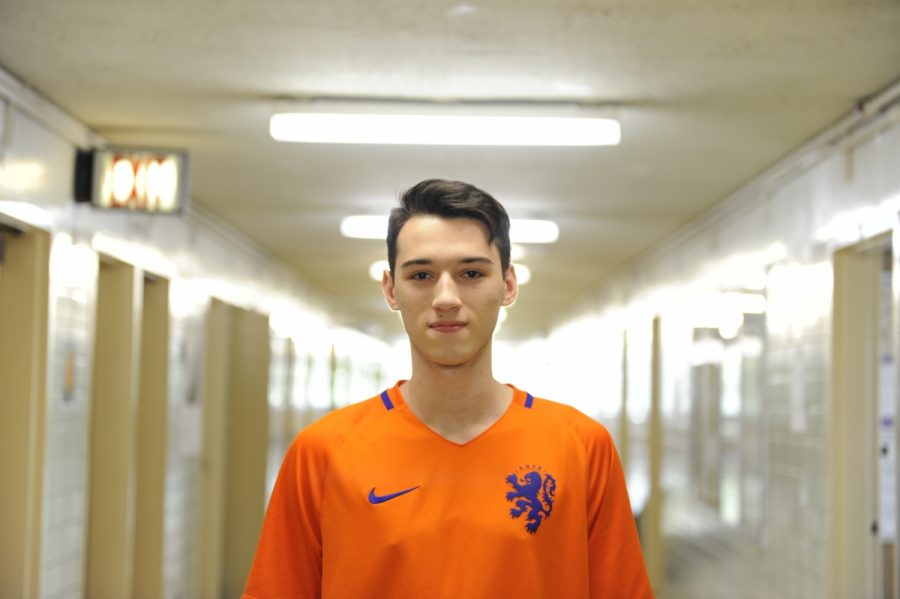World Cup Bringing Students Back to their Roots
Despite the fact that the Netherlands will not be competing at this year’s World Cup, Andrew Benner ’18 is still optimistic about the team. “It’s disappointing that the Netherlands didn’t qualify, but I’ll remain a loyal supporter as I await their next shot at the World Cup,” Benner said.
Every four years, soccer fans from across the world come together to watch the ‘beautiful game’ on its most prominent stage. Passionate fans eagerly await the moments of pure joy when their teams score last-minute equalizers and send their opponents packing. At the same time, fans can be found desperately trying to avoid bad luck with bizarre traditions, crossing their fingers during penalty kicks, and angrily screaming at referees when their favorite players receive fouls.
This whole spectrum of emotion can only be found at the World Cup, which which will kick off June 14th and runs until July 15th, 2018, this year. In the opening match, the host nation, Russia, will take on Saudi Arabia in front of more than 80,000 attendees plus hundreds of millions watching from home. After a lengthy bidding competition in 2010, Russia was chosen to host the international soccer tournament over England; Belgium and the Netherlands, who placed a joint bid; and Portugal and Spain, who also placed a joint bid.
Among the millions of supporters across the world who will be following the World Cup are many Bronx Science students who have personal connections to the competing teams. Whether it be familial loyalties or their awe of certain players, fans of the sport will be following the matches from start to finish in anticipation of dramatic moments of brilliance.
“Whenever the World Cup is on, I feel such a strong cultural connection to my family in Argentina,” said Lucio Vainesman ’18. “Every World Cup, [my father] feels like he’s back at home, singing the national anthem and wearing his light blue and white stripes.”
Out of all of the teams, Germany, the winner of the 2014 World Cup in Brazil, has already garnered heavy support among students. Many students have been attracted to the German team due to their skill and dominance on the pitch and are expecting the team to prove why they are ranked #1 in the world by FIFA.
“I am dreaming of a final where Germany beats Spain,” said Krishna Shivani ’19. “They both play a style that’s centered around passing, but unlike Spain, Germany can pass and press high up the field.”
Others, like Maximilian Porlein ’18, have roots that link them to the team. “Germany is my second home and nearly all of my family lives there,” said Porlein. “We still have strong team chemistry and a desire to come out on top. While many of our older players have left, many of the young talents who played in 2014 are more seasoned and have enough experience to do well this year.”
Another team looking to repeat its 2014 success is Argentina, led by a strong attack featuring Lionel Messi, arguably one of the best players in the world.
For Lucio Vainesman ’18, however, the emergence of the Argentinian side means more than trophies or goals scored. “Whenever the World Cup is on, I feel such a strong cultural connection to my family in Argentina,” explained Vainesman. In an interview, he detailed how important the World Cup is to his father, who emigrated from Argentina forty years ago and still feels tied to his homeland. “Every World Cup, he feels like he’s back at home, singing the national anthem and wearing his light blue and white stripes. He has been to the past two world cups to support his team, describing it as almost a one month festival and a truly special place considering all thirty-two countries are gathered in one place to play soccer.”
England, a perennial challenger for the Cup, has also qualified, and is looking to make an impression in Russia.
“They have several exciting young players in Dele Alli, Harry Kane, and Raheem Sterling. I think if they work together, then England can do well during this tournament,” said Krish Shah ’21.
One student who is particularly excited for their appearance is Zayaan Shariff ’19, who was born and raised in London and has relatives who live there. In the past, the trio has disappointed with the players’ lackluster performances on the international stage, but this time around, Shariff believes the team will bounce back. “I am more confident England will do well this year, because we have a good manager, and we have some quality players,” said Shariff. On the other hand, he is still tempering his expectations of the team, reflecting, “You never really know with England, so I’m not going to get my hopes up too much.

In Poland, powerful striker Robert Lewandowski is viewed as a hero for bringing the national team back to prominence. “Lewandowski is one of the best Polish players of all time and I would say he’s the best striker in the world at the moment,” said Alexander Smyk ’18.
As always, some teams are left out due to their subpar efforts in qualifying. Followers of the sport will be keen to notice the absence of many historically-dominant nations this year, most notably Italy and the Netherlands. For the first time in sixty years, the Italian National Team failed to qualify for the World Cup, joining the Netherlands, the third-place finisher in 2014, as one of the few powerhouse nations forced to watch the global spectacle from home.
“It’s disappointing that the Netherlands didn’t qualify, but I’ll remain a loyal supporter as I await their next shot at the World Cup,” said Andrew Benner ’18. “My father’s side of the family comes from the Netherlands, so I will always root for them, no matter how difficult their struggle.” As a matter of fact, it seems as though Benner may not have to wait long for his squad’s return to glory. On May 20th, the Netherlands’ under-seventeen team won their third UEFA Championship by defeating Italy in a penalty shootout, proving the potential of the rising Dutch stars.
Additionally, Chile, the United States, Cameroon, and Ivory Coast, all recent winners of major domestic competitions, will be absent from the World Cup after failing to qualify. Oddly enough, this is the first time the United States has not qualified for a World Cup since 1986, even though the team is regularly viewed as underdogs on the main stage.
When U.S. superfan LiChai Epperson ’19 realized that the team did not earn enough points in the qualification stage to advance to the Cup, he was truly disappointed. “Soccer is becoming such a massive sport in this country, so it’s a shame we missed out,” said Epperson. He also lauded the efforts of nineteen-year-old forward Christian Pulisic who has been a bright spot for both his club, Borussia Dortmund, and the international team. “It is sad that Pulisic won’t be able to play. He’s extremely talented, not just in terms of the American style of play but also in comparison to the best in the world.”
While many of these talented teams will not be participating in this year’s World Cup, several up-and-coming nations are being represented for the first time in many years. One nation that is looking to turn some heads is Egypt, making their first appearance at the World Cup since 1990. They are led by forward Mohamed Salah who has taken a star turn this season by smashing the Premier League goal-scoring record and earning the League’s Player of the Year honor.
“I feel like the biggest surprise this year is Mohamed Salah. He has been absolutely fantastic,” said Shah. “The only thing I fear about for Salah is him experiencing a burnout following a long season.” Yet, even after making over fifty appearances in major competitions and scoring more than forty goals overall, Salah will look to continue his dominance at the World Cup and build his successful year.
With all of these storylines already captivating fans throughout Bronx Science and bringing them back to their roots, it is hard for the typical fan to pick a side. But, it can be assured, once the World Cup begins, everyone will be in awe of the amazing talent on display and the players giving their all, out on the pitch.
More so, in a time that seemingly has more international conflict than peace, the World Cup will be a unifying force that brings together millions of people to put away their political differences and enjoy soccer at its finest. “The impact of the United States interacting with foreign nations through sport is good for us as a people to break through barriers that seem to divide us instead of unite us,” said Epperson.
James Snyder is a crossword editor and Staff Reporter for ‘The Science Survey’ as well as a Student Life Section Editor and sports photographer for...

